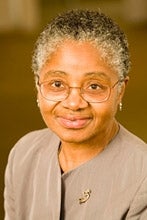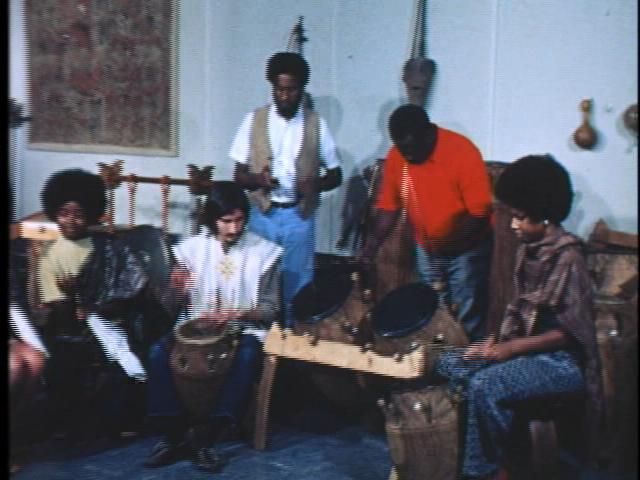Highlights from the Ethnomusicology Archive: the Jacqueline Cogdell DjeDje collections

Jacqueline Cogdell DjeDje is Professor, past Chair of the UCLA Department of Ethnomusicology and past Director of the UCLA Ethnomusicology Archive. As author and editor, her books include: Black Music Research Journal special issue, “Music of Black Los Angeles” (Spring 2011); Fiddling in West Africa: Touching the Spirit in Fulbe, Hausa, and Dagbamba Cultures (2008); Turn Up the Volume! A Celebration of African Music (1999); California Soul: Music of African Americans in the West (co-edited with Eddie S. Meadows, 1998); African Musicology: Current Trends, Vol. 1 (co-edited with William Carter, 1989); African Musicology: Current Trends, Vol. 2 (1992); Distribution of the One String Fiddle in West Africa (1980); Black Religious Music from Southeast Georgia (1979); and American Black Spiritual and Gospel Songs from Southeast Georgia: A Comparative Study (1978). She has also written numerous articles on African and African-American music, with many focusing on gospel music in California.
Professor DjeDje has deposited four different field collections at the Ethnomusicology Archive.
2013.03 - United States, Georgia, 1971. This collection consists of 14 sound tape reels. They were recorded by DjeDje in Georgia, California, and Florida in l971. Parts of the collection are described in her M.A. Thesis: "An analytical study of the similarities and differences in the American Black spiritual and gospel songs from the southeast region of Georgia," 1972. Portions of these recordings were commercially released as Black American Religious Music from Southeast Georgia. Folkways Records FS 34010 (1983). To listen via Smithsonian Global Sounds, click here.
Collection 2004.17 - Ghana and Nigeria, Dagomba and Hausa, 1972-1976, 1995, 2003. This collection consists of 87 sound tape reels, 11 sound cassettes (DAT) and 11 videocassettes (Hi8). They were recorded by DjeDje in Ghana, Nigeria, and Los Angeles, California, September 1972 - April 1976, 1995, and 2003. Tapes 1-46 are primarily research for DjeDje's dissertation: "One string fiddle in West Africa : a comparison of Hausa and Dagomba traditions" ; tapes 47-87 include: Legon Art Festival, Dagarti xylophone music, Atenteben music, Ashanti drumming, Agbekor, Bobobo, Kete drumming, Agbekor drumming, Gahu drumming, Hedzole Soundz, Kplanlogo, Ghanaian Highlife, soul and pop music in the Cote d’Ivoire, Bete music, Ugandan sanza music, Luo music, Washington Omondi, class lectures by Kwabena Nketia and Norma McLeod, and classroom listening examples. Performers include: Abu Gondze ; Alhassan Gondze ; Haruna Bande ; Iddrisu Gondze ; Sulemana Iddrisu ; Salihu Y. Ingawa ; Salifu Issah ; Salifu Lali ; Mamman Landi ; Garba Liyo ; Salisu Mahama ; Ibrahim Mohammadan ; Momman Nabarau ; Ahmadu Samunaka ; M. D. Sulley. Portions of these recordings and the song transcriptions were released as: Fiddling in West Africa (1950s-1990s): The Recording. Ethnomusicology @ UCLA Archive Series Vol. 2. EUCLA CD 2 (2007) and Fiddling in West Africa (1950-1990s): The Songbook. Los Angeles: UCLA Ethnomusicology Publications (2008).
Collection 2000.03 - Jamaica, Maroons, Dec. 1985-Jan. 1986. This collection consists of 28 sound cassettes and 22 videocassettes. They were recorded in Accompong, Jamaica between December 1985 and January 1986 by DjeDje and Carol Merrill-Mirsky. The recordings include the January Sixth celebration of the Maroons of Accompong, Jamaica, which commemorates both the birth of the Maroon leader, Kojo (Cudjoe), and his victory over the British, which resulted in the signing of the peace treaty of 1739. This fieldwork was used for: "Remembering Kojo: history, music, and gender in the January Sixth celebration of the Jamaican Accompong Maroons," by Jacqueline Cogdell DjeDje in Black Music Research Journal, vol. 18, no. 1/2, pp. 67-120. Portions of these recordings were commercially released as: DjeDje, Jacqueline Cogdell, Carol Merrill-Mirsky, and Jeff Richmond. Remembering Kojo: A Celebration of the Maroon People of Accompong, Jamaica. Los Angeles: UCLA Program in Ethnomusicology. Video recording. (1987). See ARVT 53 in the Archive for this recording.
Collection 2012.09 - United States, California, Los Angeles, gospel music, 1981-1983. This collection consists of 38 sound cassettes. They were recorded by DjeDje in Los Angeles, California, 1981-1983. The recordings include interviews with musicians, pastors, and members of several black Catholic churches in the Los Angeles area. The collection also includes copies of newspaper clippings, journal articles, workshop reports, etc. on black Catholic liturgy and music written by clergy and lay members of the Catholic Church as well as music scholars; many of the print materials were provided by the National Office for Black Catholics. Publications based on these recordings include: "An Expression of Black Identity: The Use of Gospel Music in a Los Angeles Catholic Church," Western Journal of Black Studies, v. 7, no. 3 (Fall 1982): 148-160 and "The Adoption of Black American Gospel Music in the Catholic Church," Ethnomusicology, v. 30, no. 2 (Spring - Summer 1986): 223-252.

Music and Dance of Ghana Ensemble, 1972, with Kwasi Badu (ensemble director) performing the Asante atumpan drum, and students Lynn Carpenter (not pictured), Jacqueline Cogdell (that's Prof. Cogdell DjeDje on the left), Philip Harland (sitting and playing apentema drum), Jacquelin Peters (sitting on right playing apentema drum), Elizabeth Tatar (not pictured), and male standing near Badu playing bell (name unknown).





